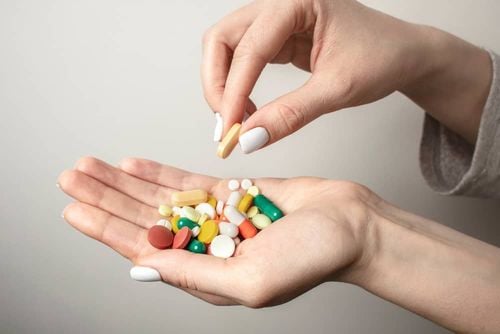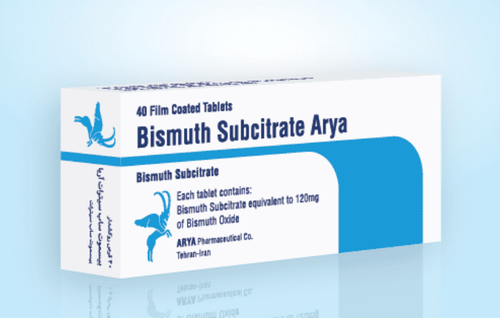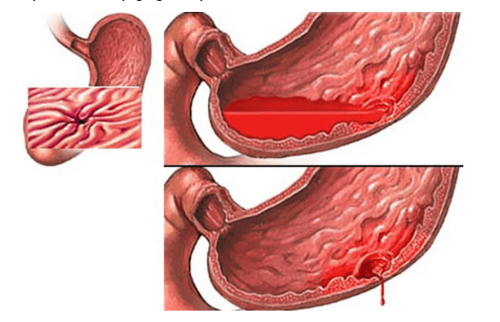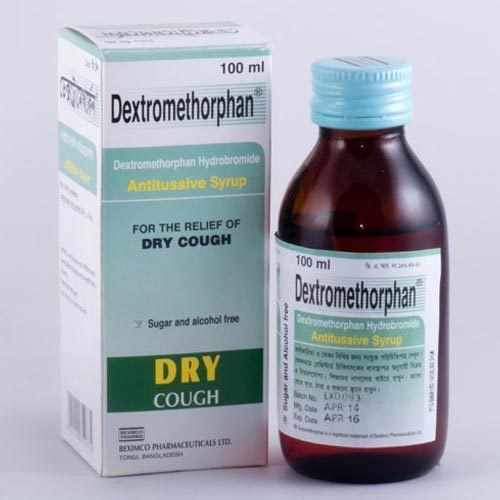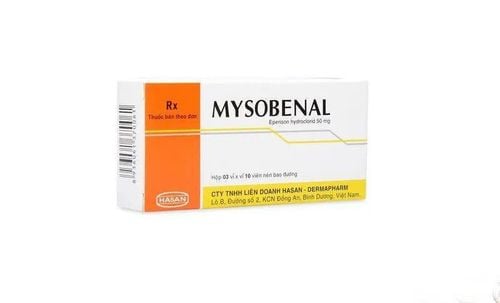This is an automatically translated article.
Bisnol medicine has the main ingredient is tripotassium dicitrato bismuthate (T.D.B.). The drug is used in the treatment of ulcers in the stomach and duodenum. The following article will share details about the uses and effective use of Bisnol.
1. What is Bisnol?
Drug group: Drugs for the treatment of diseases of the gastrointestinal tract Dosage form: Film-coated tablets, long tablets, white film-coated tablets, smooth two-sided, Bisnol's packaging: Box of 6 blisters x 10 tablets Ingredients: Active ingredient Bismuth oxide (in the form of Tripotassium dicitrato Bismuthate (TDB) 120mg content 1.1. Pharmacodynamics of Bisnol Active ingredient Tripotassium dicitrato bismuthat has a selective affinity for the bottom of gastric ulcers, but also for the mucosal lining of the stomach. Normal gastric mucosa does not have this effect.After taking the drug, a precipitate containing Bismuth is formed due to the effect of gastric acid on Bismuth.For ulcers (both in the stomach and duodenum), many Protein degradation products are released continuously in relatively large quantities by tissue necrosis
Through the formation of chelat complexes, these degradation products, together with the precipitate obtained from Bismuth, form a This barrier can also prevent the effect of Pepsin on the ulcer site.
Bismuth is effective against Helicobacter pylori bacteria. In vitro minimum inhibitory concentrations (MICs) ranged from 5 to 25 micrograms/ml.
Active ingredient Bismuth is also used in combination with proton pump inhibitors or histamine H2 receptor blockers and combination antibiotics to kill Helicobacter pylori. When used in single therapeutic doses, Bismuth compounds only kill Helicobacter pylori in about 20% of patients. However, when combined with antibiotics and proton pump inhibitors, up to 95% of patients can be eradicated H. pylori.
1.2. Pharmacokinetics of Bisnol Active ingredient Tripotassium dicitrato bismuthat is absorbed relatively slowly and varies widely from person to person. After oral administration, the active ingredient Tripotassium dicitrato bismuthat, most of the bismuth is found in the stool. However, a small amount absorbed is excreted in the urine. The potency of the active substance Bismuth depends on the local effect at the ulcer site. At the recommended therapeutic dose, absorption is small, so it is unlikely to cause toxicity.
2. What are the effects of Bisnol?
Bisnol is indicated for use in the following cases:
Treatment of gastric and duodenal ulcers. Often used in combination with other drugs, especially Metronidazol plus tetracycline or amoxicillin antibiotics (triple therapy) to eradicate Helicobacter pylori and thereby prevent the risk of duodenal ulcer recurrence.
3. Usage and dosage of Bisnol
3.1. Usage of the drug Bisnol is prepared in the form of tablets suitable for oral use.
3.2. Therapeutic doses of the drug For adults and the elderly: One Bisnol tablet 4 times a day, half an hour before 3 main meals and 2 hours after the last meal of the day; or 2 tablets twice a day, half an hour before breakfast and half an hour before dinner. The maximum duration of a course of treatment is 2 months; Do not use preparations containing Tripotassium dicitrato bismuthat active ingredient in maintenance therapy. For children: Bisnol is not recommended for use in children. However, the above therapeutic dose of Bisnol is for reference only as recommended by the manufacturer. The specific treatment dose depends on the condition and the progression of the disease. For a specific and appropriate therapeutic dose, you need to consult your treating doctor or medical professional.
4. In case of overdose or forgetting dose of Bisnol
Using Bisnol at recommended doses, rarely causes serious unwanted effects. However, renal failure, encephalopathy and neurotoxicity have been reported following acute or chronic overdose. Bismuth was detected in the blood, feces, urine and kidneys of these patients; Blood levels of 1.6 micrograms/ml were seen 4 hours after a single dose of 9.6 g.
5. In case of overdose, forget the dose
In case of overdose: Taking Bisnol with long-term treatment doses, over 2 years apart, has been reported to cause paresthesia, insomnia and memory loss. At the recommended doses with Bisnol, no encephalopathy was observed, but if bismuth blood levels exceed 10 nanograms/ml, bismuth preparations must be discontinued. The specific treatment for an overdose of Bismuth is currently unknown. The doctor will prescribe gastric lavage, purging and rehydration, even if the patient is delayed, because bismuth can be absorbed in the colon. Chelating agents may be effective early on after oral administration, and 2,3-dimercapto-1-propan sulfonic acid at a dose of 100 mg three times daily increases the renal clearance of bismuth and decrease in blood concentration. In case of missed dose: Do not use a double dose of Bisnol to make up for the missed dose. If you have forgotten to take a dose, you should take it before your next meal, as long as you do not take a double dose. If that is the case, you need to skip the missed dose.
6. Undesirable effects of the drug Bisnol
When using Bisnol, you may experience unwanted effects (ADRs). A common undesirable effect on the digestive system is black stools. Uncommon side effects, including: Gastrointestinal: Nausea, vomiting, gastrointestinal disturbances, constipation or diarrhea. Skin and subcutaneous tissue: Rash or rash. Very rare systemic adverse effects such as anaphylaxis. Instructions on how to handle unwanted effects: When experiencing side effects of Bisnol, it is necessary to notify the treating doctor.
7. Interactions of Bisnol
Pre-treatment with a drug containing omeprazole increased the absorption of bismuth by 3-fold, suggesting an increased risk of toxicity with dual therapy. Concomitant use with H2 antagonists or antacids reduces the potency of Bismuth salts compared with those used alone in ulcerative disease. Bisnol absorbs X-rays, which can interfere with X-ray diagnostic procedures of the gastrointestinal tract. Should not be used in combination with other drugs, food or drink, especially antacids, milk, fruit or juice within 30 minutes before or after taking a medicine containing the preparation tripotassium dicitrato bismuthat. This is because the effectiveness of the drug may be affected. The therapeutic effect of oral tetracycline antibiotics may be inhibited.
8. Some notes when using Bisnol
8.1. Contraindicated in treatment with Bisnol Bisnol is contraindicated in the following cases:
People with hypersensitivity or hypersensitivity to preparations containing the active ingredient Tripotassium dicitrato bismuthat or any of its ingredients. People on a low-potassium diet. People with severe kidney disease, caused by the ability to accumulate Bismuth with the risk of toxicity. 8.2. Precautions for use Bismuth compounds have previously been reported to cause encephalopathy. The risk of Bismuth toxicity may be increased if the recommended dose is exceeded, as in the case of overdose, poisoning, prolonged use of the drug or in combination with other compounds containing bismuth. Therefore, the use of systemic (oral) therapies during Bismuth is not recommended. Bisnol should be used with caution in patients with a history of upper gastrointestinal bleeding. This is because Bismuth causes black stools that can be confused with black blood in the stools.) Bisnol contains about 2 mmol (about 40 mg) of potassium per tablet. Care should be taken when using the drug in people with impaired renal function or those on a potassium-controlled diet. Bisnol contains lactose. People with rare hereditary problems of galactose intolerance, the Lapp lactase deficiency or glucose-galactose malabsorption should not use this medicine. Bisnol contains polysorbate 80, which can cause an allergic reaction, and castor oil, which can cause nausea, vomiting, abdominal pain, and diarrhea. Ability to drive and use machines: No specific reports are available. Pregnancy: No long-term studies have been conducted to evaluate Bismuth's potential to cause cancer, mutagenicity, or harm to fertility. The use of Bisnol during pregnancy is not recommended. Lactation: Bisnol is excreted in breast milk, but it is not known whether it will harm a nursing infant. Therefore, treatment with this drug is not recommended for nursing mothers unless the expected benefit outweighs the potential risk.
9. How to store Bisnol
Store Bisnol in the original manufacturer's packaging, tightly closed. Keep the medicine in a dry place, protected from light, at a temperature not exceeding 30°C and out of reach of children. Do not use Bisnol after the expiration date indicated on the package (box and blister pack).
Please dial HOTLINE for more information or register for an appointment HERE. Download MyVinmec app to make appointments faster and to manage your bookings easily.




